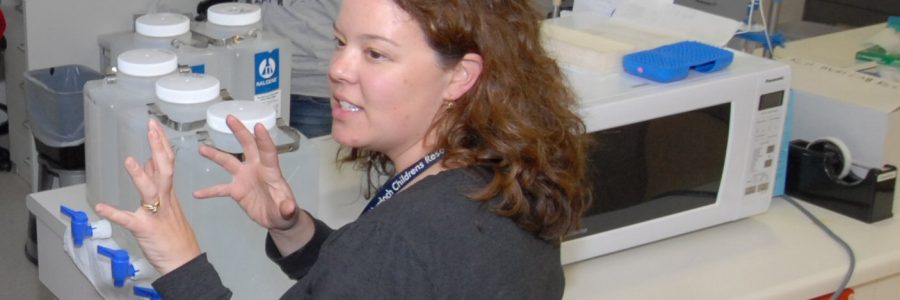
Research report – December 2008
Denise Caruso provided a further report in December 2008.
Brief Description of Project.
Building on our previous results, and those of others around the world, we are employing advanced technologies and methods to produce and administer dendritic cell based anti-tumour vaccines. Children with recurrent solid or brain tumours and newly diagnosed neuroblastoma stage 4 are eligible for this study. Patient’s tumour lysates are mixed with their dendritic cells to produce cellular immunotherapy products that are then able to produce specific immune responses against their own tumours. We will monitor their responses to vaccines at the end of study to determine in vitro markers of response correlated with clinical responses. This is a phase I study of safety and feasibility as primary objectives, with secondary aims to investigate efficacy. Our goal is to recruit fifty four patients in total, with eighteen patients for each cohort: newly diagnosed neuroblastoma stage 4, recurrent solid tumours, and recurrent brain tumours.
Project Duration.
June 2007-June 2010
Description of Progress in Current Period.
To date we have ten patients enrolled to the neuroblastoma cohort which is well above our predicted recruitment at this stage in the trial. Of those, we have treated to completion, two patients, each receiving six vaccine doses. We have had two patients enrolled on the recurrent solid tumour study, with one patient completing her immunotherapy receiving four vaccine doses. Finally we have three patients enrolled to the recurrent brain tumour study, with none of them well enough to receive vaccine. The vaccines have been very well tolerated by the patients and have had no side effects of note.
Dr Ashley has been away much of this year on sabbatical, but has recently returned, we expect that recruitment to the brain tumour and the solid tumour cohorts will increase dramatically with his input.
Future Plan for Next Term.
The future of the trial includes making vaccines for newly enrolled patients and administering vaccine doses as patients achieve stable disease and are well enough to receive them. We expect that the next year will be very busy with increased numbers of new patients. We will continue to follow all patients clinically and scientifically to further improve the therapy.
Dr Denise Caruso
